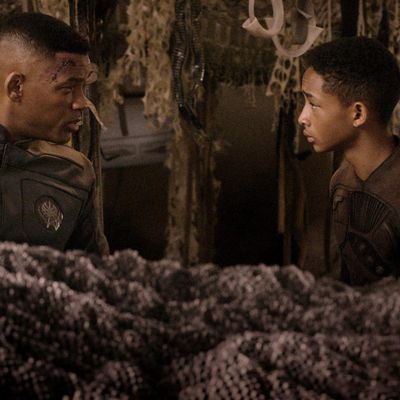
By the standards of M. Night’s Shyamalan’s recent films, After Earth is surprisingly not horrible. Of course, it’s not especially Shyamalanesque, insofar as there are no thigh-slapping climactic revelations on the order of “Swing away!” “The airport even changed the flight paths!” “The scrunt wants her because she’s not just a narf, she’s a madame narf!” and everyone’s favorite, “Let’s just stay ahead of the wind!” The Shyamster is now working as a (high-paid) hired hand to help Will Smith contrive a gazillion-dollar vehicle for his teenage son, Jaden. At the premiere at Manhattan’s Ziegfeld Theater, the ebullient director said that Will Smith “brought the muscularity,” he (Shyamalan) the “stillness,” and Jaden the “innocence.” Jaden certainly seems an innocent vis-à-vis any acting technique. But he’s earnest. Unlike, say, our last president, he must want to look as if he actually earned his silver spoon.
Ironically enough, the present that Will Smith has handed to his son is the story of a boy who desperately needs to prove himself to his father. A thousand years ago, we learn, humans fled the Earth after rendering what was once a paradise uninhabitable. They now reside on “Nova Prime.” (A whole millennium and they can’t come up with a less generic name.) Their principal enemy is a special effect called an Ursa that takes advantage of human fear. Will Smith’s Commander Cypher is a legendary Ursa killer, owing to his ability to become invisible, a “ghost.” Jaden’s Kitai, on the other hand, must look to the Ursa like a porterhouse steak. Smith Jr. has been directed to telegraph his anxiety like mad, chewing his lips and popping his eyes, putting accordion-like creases in his brow — this so he can be counseled by his father onscreen to do less. “Fear is not real,” intones Cypher. “It is a product of our imagination. Danger is real, but fear is a choice.”
Most of the movie is Jaden running and jumping and looking scared while a gravely injured Will sits and watches him on a monitor in the wreckage of a ship that has just happened to crash-land on a Class D planet that’s “unfit for human habitation.” Three guesses which one. Everything here, says Cypher, has “evolved to kill humans” — which won’t surprise anyone who lived through Shyamalan’s killer trees. (“We don’t know how plants obtain these abilities, they just evolve very rapidly.” — The Happening) Cypher has to guide his son 100 kilometers to find a lost beacon and avoid sundry native predators — as well as a non-native Ursa that happened to be onboard their spaceship and seems destined (i.e., studio-programmed) to meet up with Kitai on top of a fiery mountain at the precise instant when the potential for salvation is upon him. Can Kitai choose not to be afraid? More important, can Jaden somehow control his overemoting?
Once you accept the simpleminded setup, it’s possible to relax and let the silliness run its course. After Earth has a relatively lean palette. Ships that look like Stingrays move sinuously through space. The gradual icing of the landscape as nightfall approaches is done with a sensei’s subtlety. A cornball subplot involving a giant bird is nicely underplayed. Shyamalan handles the climactic appearance of the Ursa as if he studied Ridley Scott’s Alien and understood that the less you can focus on the threat, the scarier it is. (He knew that when he made Signs, too.) There’s one other element that snuck past my defenses. To breathe on Earth, Kitai needs a daily inhaler, and when two of the vials become smashed, Cypher writhes at the prospect of his son’s inability to breathe. Were Shyamalan and Smith deliberately invoking the terror — now omnipresent in urban African-American communities — of lethal asthma attacks in children? I’m not sure how I feel about something so real and so wrenching in the context of a Grade D (unfit for human habitation) sci-fi picture like After Earth. But unlike those killer trees (“Let’s just stay ahead of the wind!”) you can’t laugh it off.


